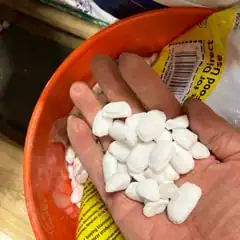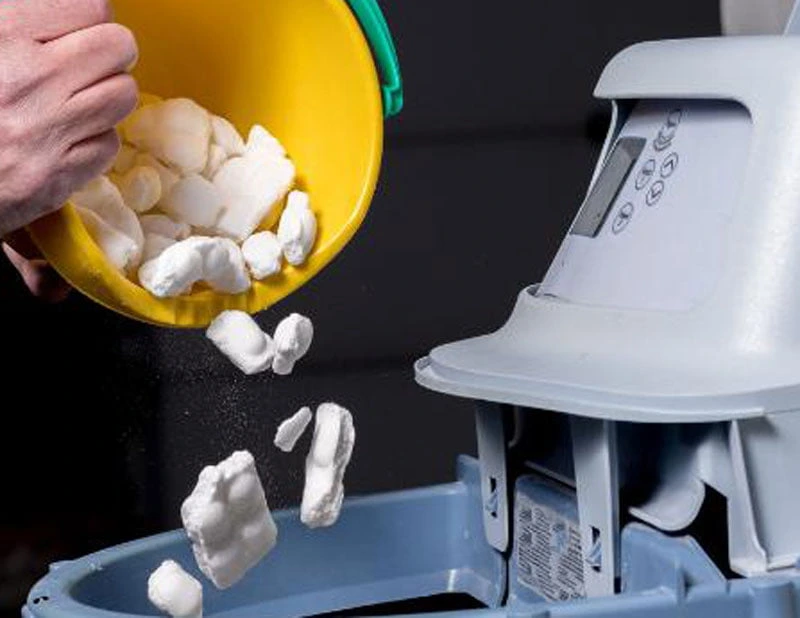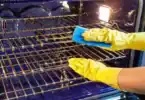Hard water can cause a variety of problems in your home, from unsightly buildup on fixtures and appliances to mineral buildup in pipes and water heaters. To combat hard water, many homeowners turn to water softener systems, which use salt to remove hard water minerals from the water supply. But with so many different types of water softener salt on the market, it can be difficult to determine which type is right for your water softener system.
In this article, I will be delving into the different varieties of water softener salt: pellets, blocks, cubes, and crystals. This salt (usually sodium chloride) works with the ion-exchange resin in your water softener to eliminate hard water. Not only will I examine the advantages and disadvantages of each type but also which one is ideal for your particular water-softening system. Thus you can make an informed choice about which kind works best for you!
What Are The Different Kinds Of Salt Used In Water Softeners?
The most common water-softener salts are pellets, blocks, cubes, and crystals. Each has its own benefits and drawback which I’ll go into below. But here is a short description of each one:
- Pellets – Pellet water softener salt is one of the most popular types and is made from evaporated brine water that has been compressed into small pellet-like shapes.
- Crystals – This type of softener salt is made from water that’s been evaporated and condensed into small crystal-like formations.
- Blocks – As the name implies, blocks are sold in solid blocks that have been evaporation-dried and compressed.
- Cubes – Cubes have been evaporated and compressed into small cubes that are water-soluble.
Make sure that you check what type is best for your water softener by reading the product manual, website, or calling the customer service number for your brand.

Water Softening salt in pellet form is often recommended in water softener owner’s manuals as a trouble free form of salt to use.
While Pellets and Crystals are readily available online, Blocks and Cubes may only be available locally. Check with your local hardware store or the supplier of your Water Conditioning system for options.
Don’t Mix Up Salts!
One thing that most water softener manufacturers warn against is mixing the types of salt that are in your brine tank. If you are using pellets, stick with pellets. If you are using solar salt crystals, stick with those. If you want to change types, you need to follow the manufacturer’s instructions to empty the salt in your tank to do the switch.
Another thing to be aware of is that some salt that is sold as “water conditioning salt” is intended for use directly in washing machines a half a cup at a time and is not intended for Water Softener Systems. Be really careful to read all of the available information if you are switching brands and/or suppliers.
How to Determine the Best Water Softener Salt
Primary Consideration: Purity
In my mind, the most important factor is how pure the salt is. I look for choices with the fewest impurities. The portion of the water softener salt that is NOT pure sodium chloride is the most likely thing that will linger in your water softener unit and eventually may cause damage to your resin bed or will reduce it’s effectiveness.
Interestingly, not many of the labels that I’ve read on salt products for water conditioners specify the purity. I would stick with purity values above 99.5% – and the two product ideas that I’ve supplied below do specify acceptable values and are intended for use in household Water Softener systems.
This is a single 50 pound bag of Diamond Crystal water softener pellets. The manufacturer quotes 99.8% purity for this Sodium Chloride product.
Solar Naturals Crystals quotes a 99.6% purity standard. Bags come in 50 pound units.
Secondary Considerations
Beyond purity, secondary factors for selecting a type of water softener salt are ease of handling, ease of storage, and cost.
Tank Size
Think about the capacity of the tank and how much salt it can accommodate. If you have a smaller sized system, Pellets and Crystals tend to be the best choice because you can easily add a partial bag. Do close up any partial bags so that the remaining salt doesn’t absorb moisture from the air, causing clumping and reducing the ease of handling.
Handling
Consider the ease of handling and pouring the salt into the brine tank. Water softener crystals or pellets are often easier to handle and pour compared to blocks and cubes.
Some of the brands are starting to package their water softener salt in plastic bags that have handles on both end of the bag. This seems like a small thing (and uses a little more plastic), but it really improves the ability to lift and pour stuff from a 40 or 50 pound bag!
Ease of Storage
Since most pourable water softener salt comes in 40 or 50 pound plastic bags, sometimes you find that you can only use part of a bag when you fill your tank up to the fill line. Pellets have the distinct advantage of not clumping up like crystals can. If you have a partially used bag or one of your extra bags gets a small hole in it, pellets remain pourable. They are also easier to pick up if you have a little spill.
Cost
Another important factor to consider is cost. My research indicates that the shape that the salt comes in has much less to do with cost than how much you buy at one time. Of course, if you buy a large quantity, you need a place to store it where it will stay dry and out of the way.
Since Water Softener Salt is heavy, and systems tend to go through it, you may want to buy salt locally and haul it yourself. Many ‘big box’ home supply stores and hardware stores carry some amount of this type of salt. If you want to see the wide variety of products and want to try a bag or two of each type of Water Softener salt shape, the online links above should help you get started on selecting the perfect salt for your particular situation.
Frequently Asked Questions
Is it okay to use Salt crystals instead of pellets?
In general, both types of salt can be effective in removing hard water minerals from your water supply, but there are some key differences to consider when deciding which type to use in your water softener. The more important consideration is the level of purity of the salt. Select a product that tells you what you are getting and target a purity level of 99.5% or higher.
Does water softener salt expire?
Water softener salt does not technically expire, but if it is not stored properly it can harden and clump.
Water softener salt that has already added to a water-filled brine tank can become contaminated with algae, rust, sediment, and other debris if the system has not been well maintained. As impurities accumulate, the resin bed in your water softener csn start to break down, leading to decreased water-softening results. If you suspect that this has happened to your system, or if you are ‘inheriting’ a water softening system when you buy a house, be sure to have your system inspected and serviced by a qualified Water Softener service technician.
Is there a difference between sodium chloride and potassium chloride softener salt?
Yes – potassium chloride softener salt is an alternative that some people choose if they are concerned about sodium intake from sodium chloride based salt for their water softener systems. Potassium chloride is a sodium-free alternative but costs more and may require adjustments to your softener’s settings. Also be aware that some water softener systems may not be able to use potassium chloride, so check with your owner’s manual or system supplier before switching types of salt.
Another warning: DO NOT MIX the two types together in your system!
Does water softener salt add sodium to my drinking water?
Yes – the water will contain a very small amount of sodium from the water softening process. If you have a concern with sodium in your diet, potassium chloride water softener salt may be an option in your system. Another pivot is to retain a source of untreated water for drinking purposes, such as a separate supply piped to an extra faucet at your kitchen sink.
Softened water can also make your coffee taste lousy – use untreated or Reverse Osmosis filtered water for better coffee.
Is softened water safe for plants or aquariums?
No! Softened water is bad for plants and fish! Use untreated water for plants. For aquariums, the best source of water is from a Reverse Osmosis filter.
How often do I need to add salt to my water softener?
Water softener salt should be added to the brine tank of your softener regularly and systems work best when consistently maintained. Depending on your water usage and hardness levels, you may need to add salt once a month or more often. Proper monitoring of the brine tank helps to ensure the best water-softening results. For more information about maintaining water softener systems, see Essentials of Water Softener Maintenance.
Is dishwasher salt and water softener salt the same thing?
Dishwasher salt is not the same as water softener salt.
Dishwasher salt is specifically designed to be used in a dishwasher to help remove tough water spots from dishes and cutlery. It should not be used in a water-softener system.
If water softener salt is added to a dishwasher it can damage the water inlet valve, as well as cause excessive soap suds. If you are out of dishwasher salt it is best to use no salt at all rather than to substitute the wrong salt.
For more about Dishwasher Salt, see Salt In A Dishwasher: A Comprehensive Guide.
Are water softener salt plastic bags recyclable?
Check the plastic package, but I can confirm that that bags from Diamond Crystal definitely are marked as recyclable plastic – of course you must have plastic film recycling available in your area. The package label also points out that rinsing the bag before putting it in the recycling is a good practice.
To learn more about recycling these bags, please see our article Breaking Down The Salt Container Recycling Conundrum. Since you’ll probably have a lot of these empty bags over time, it would really be terrific if they could be recycled properly! Thanks for caring.
What are Other Uses for Water Softener Salt?
Sometimes you have a partial bag of water softener salt that you want to use up, but you have reasons not to use it in your water softener. Maybe you are in the process of changing brands or salt types and don’t want to mix them with the new stuff. Maybe you just bought a big batch of salt at a sale, but now don’t have room to store it. Maybe you’re going to be moving soon and don’t want to haul the salt to the new place.
In any case, are there other uses for water softener salt? Consider these:
- Using Water Softener Salt To Melt Ice: A Comprehensive Guide – water softener salt can make an acceptable ice melter for icy sidewalks.
- Using Water Softener Salt in Your Pool – This article discusses the pros and cons of using water softener salt with a salt chlorine generator in your pool.
- Homemade Ice Cream Maker – These devices typically use rock salt in the ice bath surrounding the compartment holding the ice cream ingredients. Water softener salt would work fine to lower the water temperature. If you have water softener pellets, it might take longer for the salt to dissolve than rock salt.
Final Thoughts
Choosing the right water softener salt for your water-softening system is an important part of maintaining it and ensuring optimal water-softening results. Depending on your water usage, hardness levels, budget considerations, and the type of resin bed you have in your water softener, pellets or cubes may be a better option than crystals.
Ultimately, make sure you read your Water Softening system manual careful or consult with an expert when deciding which type of salt is best for your specific needs so that you can get the most out of your water-softening system.









